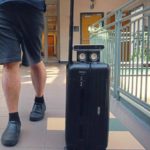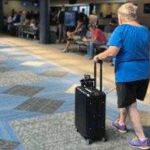The blind can lead the blind successfully.
Chieko Asakawa has proven it, time and again.
Blind since she was 14, Asakawa is a pioneering researcher at Carnegie Mellon University who is exploring how artificial intelligence can be used to help the visually impaired in everyday life, from surfing the web to using something more advanced than a red-tipped white cane to navigate the world.
Asakawa said in her TED Talk in 2015 that she wants to be independent.
“My goal is to be able to travel and do things that are simple to you,” Asakawa said, referring to people who can see.
Asakawa’s latest projects aim to help people with visual disabilities navigate airports.
“Despite recent efforts to improve accessibility, airport terminals remain challenging for people with visual impairments to navigate independently,” Asakawa, the IBM Distinguished Service Professor at CMU’s Robotics Institute, said in a news release.
“Airport and airline personnel are available to help them get to departure gates, but they usually can’t explore and use the terminal amenities as sighted people can,” Asakawa said.
As part of the university’s partnership with Pittsburgh International Airport, researchers have developed a special suitcase and smartphone app that helps people with visual disabilities to navigate airports.
The rolling suitcase, dubbed “BBeep” warns users of obstacles and helps blind people make their way through crowds at airports. It was developed by a team of researchers from CMU, the University of Tokyo and Waseda University.
BBeep is equipped with a camera and can track pedestrians in the user’s path and determine if there is a potential for a collision, warning both the user and those around to clear a path or stop to avoid a problem.
The app, NavCog, uses Bluetooth beacons, and was developed by CMU and IBM. It is already used at shopping malls and on college campuses, including CMU, but it was modified for use at an airport, where wide corridors make users vulnerable to veering, and on moving walkways that are the fastest way to get around a terminal.
The suitcase and app were tested at Pittsburgh International Airport and the researchers are presenting their findings this week at CHI 2019, the Association for Computing Machinery’s Conference on Human Factors in Computing Systems in Glasgow, Scotland.











